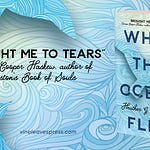In the twilight before dawn, she arrives. Spring, a month or so after the equinox, everything tending towards light, towards life, towards new growth.
A moment, a breath. The cord clamped, the pulsing nourishment that has sustained her little life, severed.
As this moment dissolves, as she’s carried away from her mother, away from the lightening sky at the window, she is also carried away from the stories of her ancestry, of her place, of her Self.
The sun rises, her mother disappears behind her, and it is as though none of it was ever there.
In place of this, she will be given the same story as many of the babies in the Baby Scoop Era, a story in which strangers and family become synonyms, in which abandonment and love are interchangeable. For these strangers, now called family, for this abandonment, now called love, she is to be grateful.
As she grows, this story will chafe against what she feels. She will not know to label her feelings as grief. What she will know—what she learned in those early weeks and months as she was taken from her mother to the hospital nursery to lie in solitude for days, and as she was then removed to a foster mother who had been instructed not to bond with her, and then further removed to strangers who were now family—is that she must do, be, say whatever they want. And so she does not doubt their story, wrong though it feels. Instead, she doubts herself, her feelings, her own inner narrative.
Their story becomes her story, their needs her Self. And so, along with her first mother, her place (landscape, culture, ancestors) of origin, along with those stories, she loses her Self.
She is Alison in When the Ocean Flies. She is me. She is so many of us whose mothers relinquished us, by choice or by force, and who were told to be grateful for this loss.
In When the Ocean Flies, Eilidh writes to her granddaughter, Alison, whom she has seen only once before Alison was given up for adoption:
“I think of you growing, discovering earth and sky, discovering yourself, finding your voice…I pass these stories on to you to carry on our beating heart, to encourage you to always speak your truth.” -Eilidh, When the Ocean Flies (pp122,123)
Her words to Alison demonstrate her understanding of the importance of connecting with our own truth, our own voices on both an individual and a communal level. She understands the danger in silencing any strand of story.
In her TED talk, The Danger of a Single Story, Nigerian author Chimamanda Ngozi Adichie addresses what happens when only one perspective is offered as the complete story instead of the varied threads that make it truly whole and authentic. This danger applies not only to communities and to cultural voice but also to individuals. In the talk, Adichie is discussing how she found her authentic cultural voice despite the prevailing narrative about her country and, by extension, her Self.
In the case of adoption, the ‘single story’ is the one presented by the adoption agency, the adoptive parents, the culture at large that supports that prevailing narrative, one that ignores the other threads that form the story: that of the biological parents, their extended families and cultures as well as that of the adopted person.
In addition, what happens when the origin story is completely altered—the beginning of the story is eradicated, and the false narrative that replaces is it the complete opposite of the lived, felt experience? When what the person is being told by everyone around her—family, society—stands in direct opposition to what she feels? And the words she might use to craft her self-narrative and so to come to an understanding of her circumstances and her self—grief, loss, yearning—are out of reach?
A sense of distrust, of not belonging, sets in. A deep, desperate yearning to come ‘home’ abides within. Often, the quest to resolve this begins as a search for the family of origin. Even when this quest is ‘successful’, as in, the person finds and is accepted by the family of origin, it isn’t the full resolution. After years, perhaps decades of separation from the authentic Self, from the agency to tell our own story, what we really want is to come home to—to fully belong to—our Selves, and to be free to tell and shape our stories in whatever ways ring true to us.
I’ll discuss the journeys we take in search of our stories, in search of identities that are resonant with our lived truth, of red herrings and pitfalls on the way, and of integration of all that has been, in upcoming posts.
In the meantime, you can read Alison’s journey as she searches for her story, her voice, her self in When the Ocean Flies. And if you’re an adult adoptee looking for help in this area, you can discover how to find your own voice and tell your own story in upcoming classes, linked here.
Adoptees, You Belong.
You can write your own story.
You can be the author of your life.
xox







Share this post